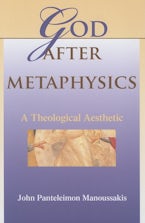"Manoussakis makes a solid contribution to the growing literature in continental philosophy of religion. Like most works in the field, it is really more of an essay than a scholarly monograph. While the author offers a creative and provocative riff on the conditions of possibility for an "experience" of God, the discussion is neither located within nor accountable to existing secondary literature on the problem (glaringly absent is any engagement with David Bentley Hart's 2003 book, The Beauty of the Infinite). As a result, he sometimes repeats moves that have already been made by others (the "incarnational" move has been made by Jean-Luc Marion, myself, and others), or fails to respond to challenges to his model in the existing literature (e.g., regarding the persistent binary logic he assumes). However, Manoussakis, like Marion before him, helpfully engages the substantive claims of patristic resources, particularly the Eastern fathers. But he continues to be haunted by a penchant for supposed philosophical neutrality insofar as he seeks to unhook these theological resources from "their doctrinal authority"—as if philosophy doesn't admit all kinds of other extra-philosophical "authorities." Nevertheless, the book repays careful, critical reading."—church and postmodern culture, 6/9/10
"Elegant and incisive, God after Metaphysics engages the 'theological turn' of contemporary phenomenology at a deeper, richer, and more satisfying level than many recent books. Manoussakis is entirely right to stress the importance of what it means to be 'n relations with God' and to see this as essential to theology today. Well grounded in patristics, Manoussakis shows us that the future of theology and its past are not in contradiction, and must be thought together."—Kevin Hart, University of Notre Dame
". . . [a] combined ability to revitalize traditional sources and to make everyday phenomena glimmer under its examination, God after Metaphysics is sure to provoke both debate and wonder for those interested in continental philosophy of religion.vol. 9 no. 3 (Fall 2008)"—Wilson Dickinson, Dept Religion at SyracuseUniversity
". . . Manoussakis's book frames some interesting questions for philosophical theology. His use of Eastern theology as a complement to continental philosophy of religion is adroit and adds to his unique argument.Vol. 34, 4 Nov, 2008"—Forrest Clingerman, Ohio Northern University
". . . for those whose research engages continental philosophy, Manoussakis's book frames some interesting questions for philosophical theology. His use of Eastern theology as a complement to continental philosophy of religion is adroit and adds to his unique argument.Vol. 34, 4, December 2008"—Forrest Clingerman, Ohio Northern University
". . . [A] solid contribution to the growing literature in continental philosophy of religion. . . . Recommended."—Choice
"Manoussakis offers brilliant examples of how phenomenology fosters a deeper understanding of the essentially interpersonal dimension of human existence and an encounter with the divine. . . . the reader will find it hard to deny that phenomenology, insofar as neatly compliments classical metaphysics, is a welcome companion on the theological journey.Vol. 16, 1 December 2008"—Daniel B. Gallagher, Sacred Heart Major Seminary
"Elegant and incisive, God after Metaphysics engages the 'theological turn' of contemporary phenomenology at a deeper, richer, and more satisfying level than many recent books. Manoussakis is entirely right to stress the importance of what it means to be 'in relations with God' and to see this as essential to theology today. Well grounded in patristics, Manoussakis shows us that the future of theology and its past are not in contradiction, and must be thought together."—Kevin Hart, University of Notre Dame
"I have not seen anything in breadth, importance, and intensity like [Manoussakis's] conception of God after metaphysics in all the years I have been teaching at the Sorbonne and the University of Chicago! —Jea"—Luc Marion

